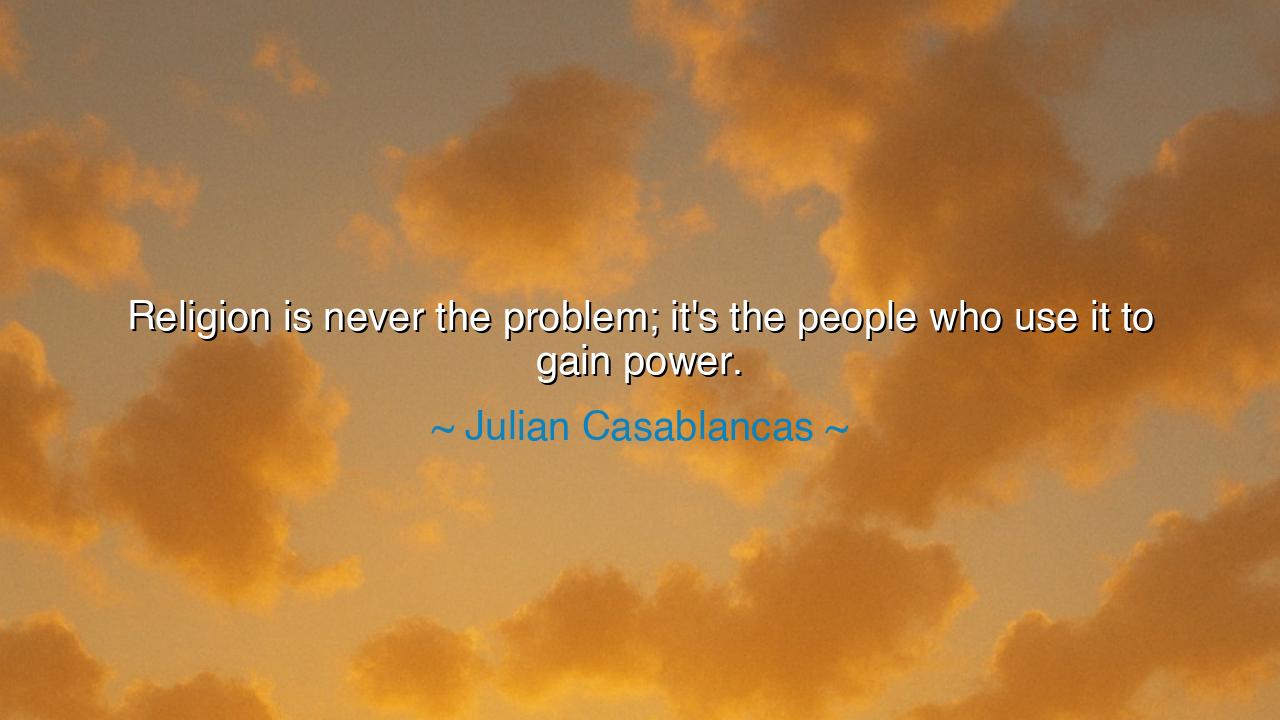
Religion is never the problem; it's the people who use it to gain






“Religion is never the problem; it’s the people who use it to gain power.” – Julian Casablancas
In these words, Julian Casablancas, the musician and observer of the human condition, speaks with the clarity of one who has seen the dual nature of faith — its light and its shadow. His statement is both a defense and a warning: religion itself, he says, is not the sickness that afflicts humanity, but the mirror that reveals it. Faith, in its purest form, is born of love, humility, and wonder — a bridge between man and the infinite. Yet, when men seize that bridge as a throne, when they twist devotion into dominion, the sacred becomes a weapon. Thus Casablancas reminds us that the divine is not corrupted by belief, but by power — and it is power, not faith, that poisons the soul.
From the dawn of civilization, humans have sought connection with something greater than themselves. The ancient ones raised temples to the sky, burned incense to unseen gods, and whispered prayers to the winds. These acts were not born of greed, but of awe. Religion — in its original form — was humanity’s song to the cosmos, a language of gratitude and reverence. It taught compassion, justice, and the unity of all life. But as societies grew, so too did ambition. The sacred flame that once illuminated the heart became a torch in the hands of rulers, priests, and conquerors. It is this distortion — this use of the holy for worldly gain — that Casablancas condemns.
Consider the history of the Crusades, when armies marched beneath the banner of the cross, claiming to serve God while pursuing power, land, and gold. The faith that had preached love of neighbor was turned into justification for slaughter. The words of Christ — “Blessed are the peacemakers” — were drowned beneath the clash of swords. Religion was not the cause of the bloodshed; rather, it was the cloak that covered the ambitions of men who craved dominance. Through such moments, history teaches that when belief becomes a tool, the soul of religion dies, leaving only ritual and control in its place.
Yet the opposite also holds true. When faith is kept free from the thirst for power, it becomes a force of transformation. St. Francis of Assisi, born into wealth, renounced all possessions to live in simplicity and serve the poor. He did not seek control; he sought compassion. His life shone with the gentle power of humility, showing what religion can be when it is lived as love rather than authority. Likewise, Mahatma Gandhi wielded his faith not as a weapon but as a light, guiding millions toward nonviolence and freedom. These are the souls who prove Casablancas’s truth: religion itself is blameless — it is only when it is wielded by the proud that it becomes corrupted.
At the heart of his quote lies a timeless principle: the danger is not in faith, but in ego. When belief becomes a ladder to personal glory, when leaders use divine words to silence dissent, the sacred turns profane. The ancient philosophers warned of this. Lao Tzu spoke of the sage who governs with humility, not coercion; Socrates condemned those who used virtue as performance. True spirituality, they said, cannot serve two masters — God and ambition. The moment religion bends its knee to power, it ceases to serve truth and begins to serve tyranny.
The lesson is this: guard the purity of what you believe. Question those who preach fear instead of love, hierarchy instead of harmony. Seek the divine not in the speeches of the mighty, but in the kindness of the humble, the compassion of the forgotten, the silence of your own heart. The sacred is not found in the hands of those who command, but in the hearts of those who give. True faith asks for no throne, only sincerity.
So, children of the spirit, remember Casablancas’s wisdom: “Religion is never the problem; it’s the people who use it to gain power.” Do not curse faith because men have twisted it; instead, reclaim it. Live as the prophets lived — not to rule, but to serve. Let your belief be an instrument of peace, not pride. And when others wield the divine to dominate, stand firm in gentleness, for no tyrant can conquer the soul that worships through compassion. For in the end, power fades — but love, the true face of faith, endures forever.






AAdministratorAdministrator
Welcome, honored guests. Please leave a comment, we will respond soon